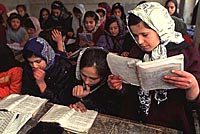 United Nations Educational, Scientific and Cultural Organization
United Nations Educational, Scientific and Cultural Organization United Nations Educational, Scientific and Cultural Organization
United Nations Educational, Scientific and Cultural Organization
UNESCO deploys its action in the fields of Education, Natural Sciences, Social and Human Sciences, Culture, Communication and Information.
Education
Since its creation in 1945, UNESCO has worked to improve education worldwide through technical advice, standard setting, innovative projects, capacity-building and networking. Education for All (EFA) by 2015 guides UNESCO’s action in the field of education and indeed, in an intersectoral manner, throughout all its fields of competence.
UNESCO’s educational priorities: